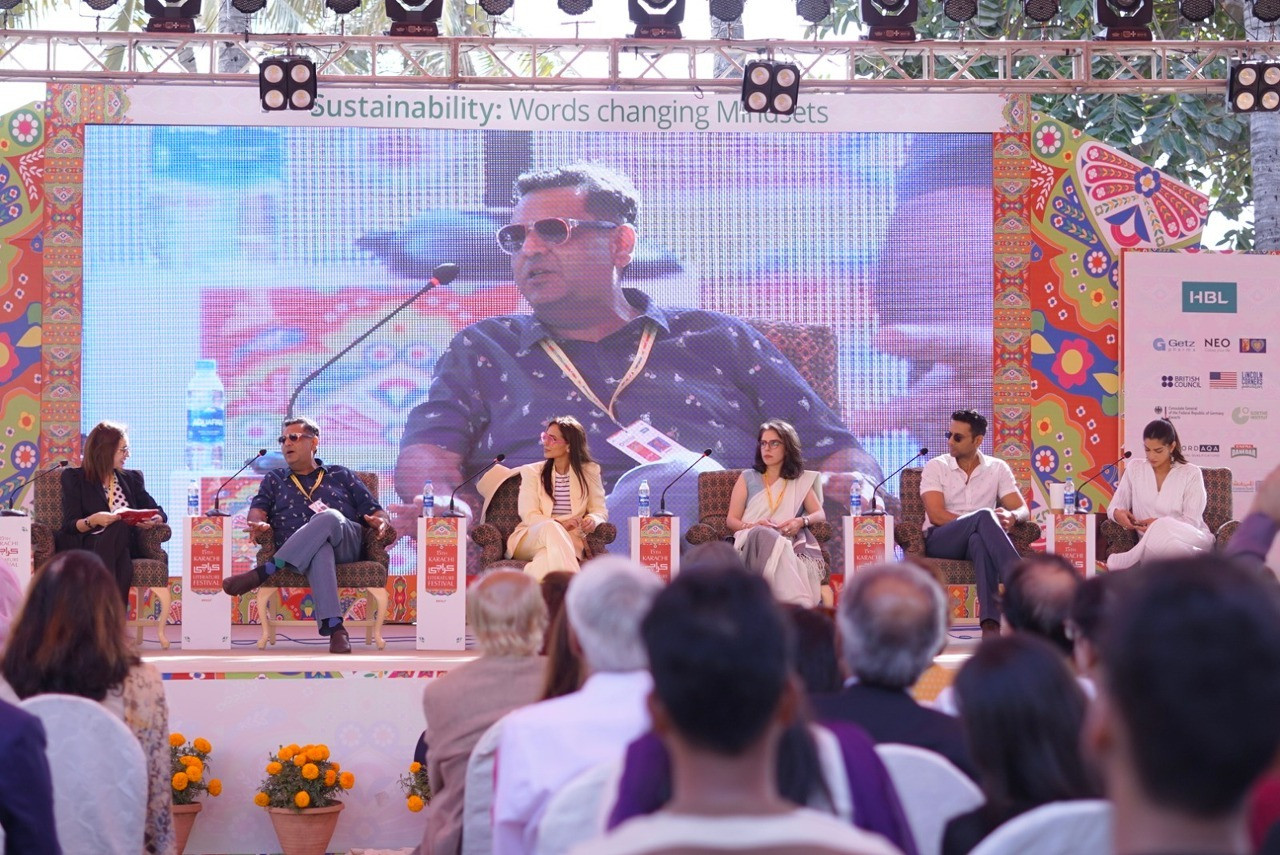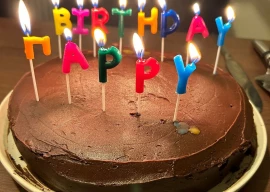
The 15th edition of the Karachi Literature Festival (KLF) concluded its three-day at the Beach Luxury Hotel on Sunday. Steeped in the tradition of delving into the pulse of contemporary issues, this year's theme, ‘Sustainability: Words changing Mindsets,’ promised a profound exploration of critical challenges facing the city, the country and the world.
With a robust lineup of over 76 sessions, including 25 book launches in both Urdu and English, KLF 2024 entertained a global audience as per usual with live streaming on OUP's social media channels, breaking geographical barriers and making the festival a truly international affair. Poetry readings, feature films and a curated series of short independent film screenings added vibrancy to the occasion.
As the sun set on a weekend filled with intellectual engagement and literary fervour, here are five key points to ponder over from this year's KLF:
1. Amtul Baweja talks constructive criticism
KLF15 celebrated the promise of tomorrow with one enlightening panel focusing on the future of emerging entertainment and content creation formats like vlogging. ‘Vlogvolution: Content beyond Likes’ gathered big social media personalities: Bilal Hassan, Osamah Nasir, Amtul Baweja and Kazi Akber to address the unique challenges of creating engaging and authentic content in a saturated market.
Actor and former VJ Anoushey Ashraf moderated the panel that shed light on social media’s hypervisibility and the fine line between criticism and personal attack.
“I always say I’m open to criticism as long as it's about the content,” Baweja stated on the subject of online vitriol. “Tell me my direction wasn’t good, my storytelling could be better, my shots can be better - that’s good criticism.” The comedian urged online critics to consider if they would make similar comments face-to-face, emphasising the significance of respect and communication even in public spaces.
“People say it’s a public platform but does anyone go to a public park and shout disparaging remarks at others?” Baweja set the record straight that public platforms and spaces are not a free licence to say just about anything.
2. Nadya Chishty Mujahid on writing flawed characters
“If you’re too perfect, why would anyone want to write about you?” offered Nadya Chishty Mujahid while she launched her book Timeless College Tales in conversation with moderator Nusrat Khawaja. The author reflected on the power dynamics and rivalries on college campuses that undergird her latest offering. At a time when the ‘antihero’ has become a popular figure, Mujahid described her characters as heroic, yet flawed, explaining that their appeal is driven by their imperfections.
According to Mujahid, these gritty and explicit stories are meant to give readers insight into the experiences of today's youth. When asked about the short story format, she attributed its success to feedback from her students, delving into how she does not have the experience of a novelist but the format and extensive engagement from her students made her book possible.
3. Remembering Noor Jehan’s perfectionism
In a panel dedicated to late musical icon Noor Jehan, the singer’s daughter Nazia Ejaz Khan, her granddaughter Sonya Jehan and veteran musician Arshad Mahmud made an appearance to pay homage. Grandson of Noor Jehan, Ahmad Ali Butt moderated the heartfelt conversation, while the panelists divulged the Jadon Holi Jayee singer’s impressive flair for punctuality.
Mahmud recalled the time a recording session ended late at night and he expressed doubts after Noor Jehan promised to show up at 8 in the morning to resume. “Next day, she was there at 8 on the dot,” the composer lauded her discipline and punctuality, calling her “a total professional.”
Khan nodded in agreement, saying, “I would add to that. Her work ethic is something that has inspired me all my life. She expected excellence and she was ready to work hard for it. When she would see people approaching their work with dishonesty, she would say that if you’re not true to your own work, you can’t be true to anyone in your life.”
4. Abid Aziz Merchant addresses censorship in Pakistan
Moderated by author Saba Karim Khan, ‘Film: The Power Of Storytelling’ found actors Sanam Saeed, Mohib Mirza, Faryal Mehmood, producer Abid Aziz Merchant and screenwriter Bee Gul in deep contemplation of Pakistani cinema and its future. Amidst appreciating the turn towards ‘gritty’ genre explorations and the move away from film as purely fun and entertainment, the panel discussed the obstacles that many well-made stories run into.
“We made a film, it was a Grand Jury Award nominee at the South by Southwest in 2020. It starred Faran Tahir, our legendary Qavi Khan in which we tried to show that Muslims are not terrorists but it got banned in Pakistan because our censor boards didn’t understand the film,” Merchant explained how I’ll Meet You There was denied a theatrical release.
Elaborating on the intentions behind the project’s premise, Merchant described that the film set out to underscore stereotypes that are readily attached to Muslims in the West. “They [the censor board] said ‘you’ve shown Muslims as terrorists’ and I said no, that’s what FBI is wrongly assuming.” The producer chronicled how his efforts to get his film greenlit were spent in vain before he urged the censor board to be “a bit more understanding and liberal”.
5. Maniza Naqvi on Pakistani English writers
Pakistani English language literature has grown against the backdrop of a declining readership. Writers Muneeza Shamsie, Salman Tarek Kureshi, Maniza Naqvi and Taha Kehar joined moderator Claire Chambers for a conversation on “coming of age” in emerging Pakistani stories in English. The panelists underlined the challenges posed by diasporic identities and tensions between English and regional languages.
According to Naqvi, “I think something really interesting is happening with writers of Pakistani heritage who were born in the US or the UK or even those who are still here, I think we are all occupying this ‘in-between’ space that can’t be defined as this or that.”
The author maintained that the availability of multiple cultural contexts enriches the craft of Pakistani writers. “We can speak and emote and think and feel and love from many different directions…Writers from this part of the world are occupying the world because they are meeting the moment,” Naqvi furthered on.
Have something to add to the story? Share it in the comments below.






1730874433-0/Copy-of-Untitled-(64)1730874433-0-270x192.webp)


1729930993-0/WhatsApp-Image-2024-10-26-at-08-52-06-(2)1729930993-0-270x192.webp)
1729844217-0/WhatsApp-Image-2024-10-17-at-11-58-38-(1)1729844217-0-270x192.webp)






COMMENTS
Comments are moderated and generally will be posted if they are on-topic and not abusive.
For more information, please see our Comments FAQ